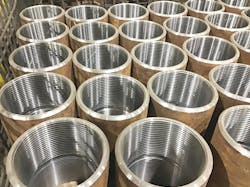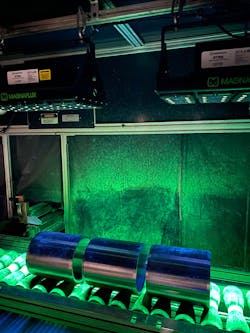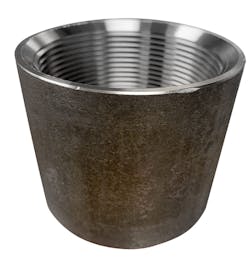High tolerance threaded couplings surpass API standards
In the production of oil and gas, Oil Country Tubular Goods (OCTG) such as casing, tubing, piping and pipelines are the foundation of well and pipeline design. As a result, the industry mandates that OCTG products are manufactured according to American Petroleum Institute (API) standards and graded based on performance and materials used.
Within this broader category, precision threaded couplings play a critical role in securely, reliably connecting multiple lengths of casing and piping of varying sizes. These couplings typically have internal threads (female threadform) that are machined to match the external threads (male threadform) of the long joints of casing.
Unfortunately, couplings are under tremendous stress. Downhole pressures, high loads and extreme torque requirements are pushing the limits of first-generation connections beyond the API and International Organization for Standardization (ISO) standards required of OCTG products.
The challenge is that oil field couplings can fatigue and fracture due to stress concentration, particularly if reused many times. Extreme stress, torque and internal pressures can all contribute to coupling failure. Exposure to acidic fluids can also cause accelerated corrosion and degradation in the coupling material.
The extreme forces and harsh environment can also compromise the coupling’s threaded connection, leading to leakage, loosening and eventual failure.
The result can be catastrophic. When couplings crack, split, rupture, fall off or cause a well pipe string to break, it can lead to massive financial losses while posing serious environmental, health and safety risks.
Although couplings that meet established API and ISO standards have traditionally withstood most of these stresses, current industry practices have only increased internal pressures and pushed couplings beyond the yield point.
As a result, the semi premium and premium couplings are now in demand and specialty machine shops that produce OCTG threaded couplings are stepping forward to resolve oil field challenges by using advanced machining techniques, unique design features and specialized coatings to manufacture couplings that far surpass API and ISO requirements.
More precise, specialized couplings required
The greater demands placed on couplings in oil and gas exploration is encouraging a market shift toward more precise, specialized couplings, according to Philip Moroco II, PTR Group LP, PTR Group, a multi-company business group that offers world-class contract manufacturing of components and subassemblies in metal and plastics.
“Today, semi premium and premium couplings require very close tolerance machining, approximately 0.001 inches for thread leads and tapers and 0.0005 inches on the thread profile,” says Moroco. “While most CNC machinists can hold very close tolerances, it can be challenging to make precision couplings that meet the required specifications given the types and grades of material used.”
He notes that the material commonly used for these couplings is hot rolled, seamless ASTM 4125 through 4140, quench and tempered to the requirements of API P110. The medium-carbon chrome-molly steel is known for its hardenability & toughness. Thus, providing these connections superior mechanical properties for deep wells.
According to Moroco, semi premium couplings are machined to tight tolerances, but are based off an established API thread profile. This can include a buttress thread profile (a screw thread profile with an asymmetric shape) that allows the thread to have low friction and withstand greater loads in a single direction. Premium couplings are machined to the tightest tolerances and may incorporate substantial design changes, often to the threads.
One example is the wedge style thread, which is designed to create the largest possible contact surface area at make-up to provide superior compression and torque strength compared to couplings with conventional threads. However, wedge style threads are much more difficult to manufacture than standard or semi-premium options.
“When tightened, a wedge style thread engages to create a very strong metal-to-metal seal in the connection,” said Moroco, adding that the four-to-one thread lead also speeds assembly of the coupling to the casing.
American Cap Company, the division of PTR Group that specializes in machining precision couplings, can operate virtually 24/7 with three shifts and has produced as many as 40,000 units in a month for OCTG customers.
Although the company can source the raw materials, they prefer to receive the metal coupling stock from the customer. This provides what Morocco describes as a “win-win” because American Cap can hold the stock in inventory and convert the parts in what he calls “quick turn coupling manufacturing” while the customer avoids paying the standard markups.
According to Jeff Kneubehl of Wheatland Tube, American Cap has produced many types of API couplings under this type of arrangement for connection to horizontal, above ground line pipe, merchant coupling and rigid conduit coupling. Wheatland Tube is a division of Zekelman Industries, the largest independent steel pipe and tube manufacturer in North America.
“[American Cap does] everything needed for couplings. Moreover, their specifications, identification, and inspection are way beyond what we require,” Kneubehl said.
Kneubehl said Wheatland Tube initially used American Cap as a source for plastic thread protectors of various sizes for the ends of tubing and piping. The company designed the thread protectors, made the injection molding tool and manufactured the parts on site.
Impressed with the operation, Wheatland Tube asked PTR group to produce API couplings. The ability to produce precision parts from different types of materials including many types of metals, alloys and plastics, is the result of an aggressive strategy of acquisition by PTR Group, American Cap’s parent company.
The company has strategically acquired companies that offer complementary parts, with manufacturing differentiated by material and product type, to broaden the breadth of their overall parts portfolio. The growth strategy, which is known in M&A circles as concentric acquisitions, allows PTR Group to share resources and facilities across companies to lower costs for their customers.
Moroco notes that American Cap can customize couplings to meet the certification requirements of any OCTG customer. The company currently manufactures seamless coupling products including API – 5L and API – 5CT for the natural gas and oil industries.
The API – 5L couplings meet the standards for use for conveying gas, water and oil. The design covers seamless and welded steel-lined pipes and includes plain-end, threaded end and belled-end pipe, and pipe with ends prepared for use with special couplings. API – 5CT seamless couplings provide standards for casing and tubing. This standard specifies the delivery conditions for steel pipes, coupling stock, coupling material, and accessory material.
According to Moroco, the OCTG customer can specify numerous factors, such as the grade of material (i.e.-API or proprietary), operating conditions it must withstand, and assembly process used.
According to Todd Diehl, PTR Group manager, American Cap upgraded their production line by adding manganese phosphate coating, an inorganic compound used to protect the surface of steel products in various industries. Among general phosphate coatings, manganese phosphate provides the highest hardness as well as superior corrosion and wear resistance compared to traditional coatings like zinc phosphate.
“Traditionally zinc phosphate has been the thread coating of choice, but manganese phosphate is much more durable and has a better coefficient of friction. That makes it a superior coating for wedge style couplings,” Diehl said.
American Cap also introduced individual tracking of each coupling using a serial number for traceability, instead of tracking items by lot, which is the industry norm for API.
“The individual part traceability allows us to track the item from the point the material arrives, through machining and inspection, to when it goes into the ground [for drilling],” Diehl said. “We maintain a high level of quality and accountability. So, if the coupling comes back for whatever reason, we have access to all the information about the production of that particular part.”
As the oil and gas industry faces increasing demands for coupling reliability and performance, OCTG manufacturers can meet the need by partnering with a coupling supplier with deep expertise in everything from materials to thread coatings.
The most experienced coupling experts can play a pivotal role in ensuring quality and reliability of their customer’s products. The approach can foster greater collaboration in parts design, engineering, and fabrication to effectively resolve evolving parts requirements.
Del Williams is a technical writer based in Torrance, California.
About the Author
Del Williams
Del Williams is a technical writer based in Torrance, California.


